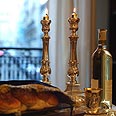
Shabbat compromise at Philly Jewish museum
National Museum of American Jewish History decides to open on Saturdays, but not to sell tickets for Saturdays on its premises that day. Gift shop will also be open but will handle no cash. 'There was not a simple answer,' says museum president
The National Museum of American Jewish History set to open next month in Philadelphia has adopted a unique compromise on an issue that pits religious teaching against economics — whether to open on Shabbat.
The five-story museum next to Independence Mall, scheduled to open November 26, is dedicated to chronicling 350 years of Jewish life in America and establishing a home base for scholarly meetings and community discussions.
But The Philadelphia Inquirer says officials had to decide whether to open on Saturdays, even though Jewish law forbids work and commercial transactions on the Shabbat. The alternative was closing on the day and turning away thousands of visitors — as well as up to a quarter of the anticipated admission revenue.
Michael Rosenzweig, the museum's president and chief executive officer, says there was "not a simple answer."
In August, a committee was appointed to review the issue and talked to rabbis but found no consensus, and looking at the policies of other institutions was not definitive.
The Museum of Jewish Heritage in New York closes for Shabbat and Jewish holidays, but the Jewish Museum in New York is open on Shabbat, although its gift shop is closed. The Contemporary Jewish Museum in San Francisco and the Skirball Cultural Center in Los Angeles and their gift shops are open on Shabbat.
'Not a religious institution'
So this month, the panel took its recommendations to the board and an unusual approach was approved:
The museum will be open Saturdays, but tickets for Saturdays will not be sold on the museum's premises that day; they can be bought online or in advance, or outside the museum at locations to be determined.
The gift shop will also be open Saturdays but will handle no cash that day; any credit card transactions will be processed after sundown.
And the museum will be closed on Rosh Hashana, Yom Kippur and on the first two days of Passover.
"It's kind of a compromise," Rosenzweig said, adding that officials do not claim the policy is dictated by Jewish law. "It's a policy the board embraced for its symbolic power, showing that in Jewish tradition, Shabbat and holidays are different."
Observant staff will have the option of not working on Shabbat and holidays, he said. The café will be closed on the Sabbath and holidays, and museum facilities, such as event space, may not be rented on those days.
"We're a Jewish institution, but not a religious institution," Rosenzweig said. "We're reaching out to the Jewish community and to the non-Jewish community, to inspire in all Americans a greater appreciation for the remarkable accomplishments of American Jews, for both themselves and the nation."
- Follow Ynetnews on Facebook










